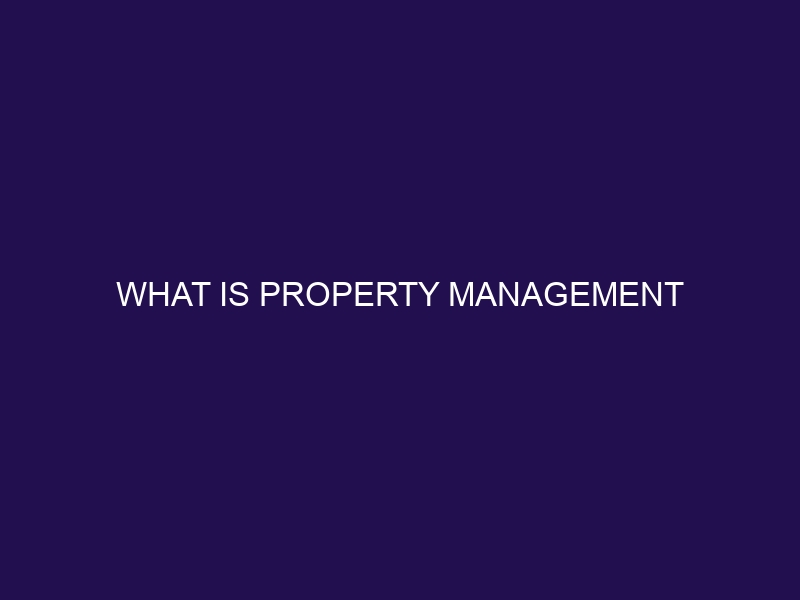What is Property Management
Property management is a comprehensive term that refers to the administration, operation, and oversight of real estate properties. It involves handling various tasks and responsibilities to ensure the smooth functioning and profitability of the property. The role of a property manager is vital in this process, as they are responsible for managing the day-to-day operations and ensuring the property meets the needs and expectations of its owners and tenants.
The responsibilities of a property manager can include:
- Collecting Rent: One of the primary responsibilities of a property manager is to collect rent from tenants in a timely manner.
- Maintaining the Property: Property managers are responsible for ensuring that the property is well-maintained, including regular inspections, repairs, and upkeep.
- Marketing and Advertising: Property managers are accountable for marketing and advertising vacant units to attract prospective tenants.
- Tenant Screening: Property managers conduct thorough tenant screening processes to find reliable and responsible tenants for the property.
- Handling Tenant Complaints and Repairs: Property managers assist tenants with any complaints or repair requests and ensure they are resolved promptly.
The benefits of property management are numerous. Property owners can benefit from professional expertise, efficient rent collection, reduced vacancy rates, and increased tenant satisfaction. Property management companies offer different types of services, including residential, commercial, and vacation rental property management, catering to the specific needs of each property type.
To aid in the management process, property managers often utilize property management software and tools. These tools can streamline tasks such as rent collection, maintenance requests, tenant communication, and financial reporting.
When hiring a property management company, several considerations should be taken into account, such as experience, reputation, fees, services offered, and communication practices. Choosing the right property management company can contribute to the success and profitability of the property.
What is Property Management?
What is Property Management?
Property management is the overseeing and operation of real estate properties on behalf of the owner. It involves various tasks such as finding tenants, collecting rent, managing maintenance and repairs, and handling any legal issues. Property managers act as intermediaries between the owner and the tenants, ensuring that the property is well-maintained and generating income. They also handle financial aspects, such as budgeting and accounting. With property management, owners can have peace of mind knowing that their property is being efficiently managed. Pro-tip: When selecting a property management company, consider their experience, reputation, and communication skills.
Roles and Responsibilities of a Property Manager
When it comes to property management, understanding the roles and responsibilities of a property manager is key. In this section, we’ll dig into the nitty-gritty of what it takes to be a property manager. From collecting rent and maintaining the property to marketing, tenant screening, and handling tenant complaints and repairs, we’ll explore the diverse tasks that fall under the purview of a property manager. Get ready to dive into the world of property management and discover the vital role these professionals play in the real estate industry.
Collecting Rent
- Enclose key answers and important phrases in <strong> or <em> HTML tags to highlight them.
- Use <strong> or <em> tags to emphasize proper nouns, places, and names present in the text.
- Do not add any new lines in the text.
- Add or Retain all existing
tags in the text.
- Add proper
tags to tables.
- Collecting rent: Collecting rent is a crucial responsibility of a property manager. It ensures a steady income stream for property owners while maintaining a good relationship with tenants.
- Timely collection: Property managers must establish a clear rent payment schedule and enforce it consistently.
- Multiple payment options: Providing various rent payment methods, such as online portals or automatic transfers, makes it convenient for tenants to pay.
- Record keeping: Accurate record-keeping of rent payments is essential for financial transparency and tracking any outstanding payments.
- Communication: Effective communication is vital regarding rent due dates, payment reminders, and potential late fees.
- Enforcement: Property managers must enforce lease agreements regarding late payments, including issuing notices and imposing penalties if necessary.
By ensuring efficient rent collection, property managers help maintain the financial stability and success of the property.
Maintaining the Property
Maintaining the property is an essential aspect of property management. It is crucial to ensure the proper maintenance of a property by following these steps:
- Regular inspections to identify any repairs or maintenance needs are necessary for maintaining the property.
- Addressing any issues promptly is important to prevent further damage to the property.
- Scheduling routine maintenance tasks, such as HVAC maintenance, lawn care, and cleaning, is necessary for property upkeep.
- Coordinating repairs and renovations with reliable contractors should be done to maintain the property effectively.
- Ensuring compliance with safety regulations and conducting necessary inspections is an important part of property maintenance.
- Documenting all maintenance activities and keeping records for future reference is crucial for property management.
- Implementing preventive measures is essential to minimize future maintenance needs and preserve the property effectively.
Property maintenance plays a significant role in preserving the value of the property and providing a safe and comfortable living or working environment. By implementing effective maintenance practices, property managers can ensure the longevity and attractiveness of the property.
One property management company successfully maintained a historic building by carefully preserving its unique architectural features and conducting regular inspections to detect any signs of deterioration. This proactive approach helped prevent major problems and ensured the property’s historical integrity for future generations to enjoy.
Marketing and Advertising
Marketing and advertising play vital roles in the field of property management, as they help to attract potential tenants and ensure optimal occupancy rates. In order to effectively market and advertise rental properties, consider implementing the following strategies:
- Create compelling property listings that include high-quality photos, detailed descriptions, and accurate rental information. This will help to capture the attention of potential tenants.
- Utilize various online platforms, such as real estate websites, social media platforms, and online classifieds, to reach a wider audience and increase the chances of finding suitable tenants.
- Implement targeted advertising campaigns that are designed to attract specific demographics or prospective tenants who are likely to be interested in your properties.
- Showcase the unique selling points, amenities, and location benefits of your properties in order to set them apart from competitors and attract more tenants.
- Collaborate with local real estate agents or brokers to increase exposure for your properties and take advantage of referral opportunities that may arise.
- Optimize your rental property websites using effective search engine optimization techniques. This will help to improve the visibility of your properties in search results, making it easier for potential tenants to find them.
- Engage in community outreach and participate in networking events to promote your properties and build relationships with potential tenants. This can be a great way to generate interest and find suitable tenants.
By incorporating these strategies into your marketing and advertising efforts, you can enhance your chances of attracting potential tenants and achieving high occupancy rates for your rental properties.
Tenant Screening
When it comes to tenant screening in property management, the process of carefully evaluating potential tenants is crucial to ensure a reliable and responsible rental experience. Here are the key steps involved in tenant screening:
- Application: It is essential to require all prospective tenants to fill out a detailed rental application that encompasses personal information, rental history, employment details, and references.
- Credit Check: Obtaining the applicant’s consent to run a credit check is necessary in order to assess their financial stability and history of paying bills on time. This step is a vital aspect of tenant screening.
- Background Check: Conducting a thorough background check is an important part of tenant screening. It helps verify the applicant’s criminal history, eviction records, and other legally relevant information to ensure the safety and security of the property.
- Reference Check: In the process of tenant screening, reaching out to previous landlords or personal references provided by the applicant is crucial. This step helps identify any red flags or commendations associated with the applicant’s rental behavior.
- Income Verification: Another crucial step in tenant screening is requesting proof of income, such as pay stubs or bank statements. This helps ensure that the applicant has the financial capability to afford the rental payments and fulfill their rental obligations.
By following these tenant screening steps, property managers can effectively select tenants who are highly likely to fulfill their rental obligations and responsibly maintain the property.
Handling Tenant Complaints and Repairs
Handling tenant complaints and repairs is an crucial aspect of property management. It is essential for a property manager to promptly address any concerns raised by tenants and ensure that necessary repairs are carried out efficiently. Here are the steps involved in handling tenant complaints and repairs:
-
Listen to the complaint: Pay attention to the tenant’s concerns and gather all the necessary information about the issue.
-
Assess the problem: Evaluate the severity of the complaint and determine if it requires immediate attention or can be scheduled for later.
-
Take action: Arrange for the necessary repairs or schedule maintenance as per the nature of the complaint.
-
Communicate with the tenant: Keep the tenant informed about the progress of the repairs and provide an estimated timeline for resolution.
-
Follow-up: Once the repairs are completed, reach out to the tenant to ensure that the issue has been resolved satisfactorily.
By effectively handling tenant complaints and repairs, property managers can maintain a positive relationship with tenants and ensure the smooth functioning of the property.
Benefits of Property Management
- Property management offers numerous benefits for property owners, making it an essential service for efficient property maintenance and operation. These benefits include:
- Expertise: Property managers have extensive knowledge and experience in dealing with various aspects of property management, ensuring efficient operations.
- Time and Stress Savings: Outsourcing property management tasks allows owners to focus on other priorities while leaving the day-to-day operations to professionals.
- Tenant Screening: Property managers thoroughly screen tenants, reducing the risk of problematic renters and ensuring a stable income stream.
- Maintenance and Repairs: Property managers handle property maintenance, ensuring that issues are promptly addressed and reducing the risk of costly repairs.
A property owner hired a property management company for their rental property. The professional management team quickly filled vacancies, conducted regular inspections, and promptly addressed maintenance issues. The owner experienced reduced stress, increased tenant satisfaction, and improved profitability, highlighting the significant benefits of property management.
Types of Property Management Services
When it comes to property management, there’s a wide range of services available. In this section, we’ll dive into the various types of property management services that cater to distinct needs. From residential property management that focuses on tenants’ comfort and satisfaction, to commercial property management that maximizes profitability, and even vacation rental property management that ensures a seamless experience for both owners and guests. Get ready to explore the diverse world of property management services and discover which one suits your needs best!
Residential Property Management
Residential Property Management is the practice of overseeing and managing residential properties on behalf of homeowners or landlords. It involves various responsibilities to ensure that the property is well-maintained, tenants are taken care of, and the landlord’s interests are protected.
- Marketing and Advertising: Attracting potential tenants through effective marketing and advertising strategies.
- Tenant Screening: Thoroughly screening and selecting suitable tenants to minimize risks and ensure a stable rental income.
- Collecting Rent: Managing rent collection and enforcing lease agreements.
- Maintaining the Property: Conducting regular inspections, coordinating repairs and maintenance, and ensuring the property meets safety standards.
- Handling Tenant Complaints and Repairs: Addressing tenant complaints, organizing repairs promptly, and ensuring tenant satisfaction.
Having a Residential Property Management company can save time and effort for property owners, providing benefits such as efficient management, reduced vacancy rates, and reliable income. With the help of property management software and tools, tasks like rental accounting, tenant communication, and maintenance tracking can be streamlined.
Residential property management has a long history, dating back to ancient civilizations. In ancient Rome, wealthy landowners hired stewards to manage their residential properties and oversee tenant relations. These stewards were responsible for rent collection, property maintenance, and resolving any disputes that arose. Over time, the role of property management has evolved, incorporating modern technologies and strategies to ensure effective and efficient management of residential properties. Today, residential property management plays a crucial role in the real estate industry, providing essential services to property owners and ensuring the smooth operation of rental properties.
Commercial Property Management
Commercial property management is the management and operation of commercial properties such as office buildings, retail spaces, and industrial complexes. When it comes to commercial property management, there are several important aspects to consider. Here is a list of key responsibilities and considerations in commercial property management:
- Rent collection: One of the essential tasks in commercial property management is ensuring the timely collection of rent from tenants.
- Property maintenance: Commercial property management involves overseeing the maintenance and repairs required for the property.
- Marketing and advertising: A crucial aspect of commercial property management is promoting the property to attract potential tenants.
- Tenant screening: Another important responsibility is screening and selecting qualified tenants for the property.
- Tenant complaints and repairs: Addressing tenant complaints and coordinating necessary repairs are crucial in commercial property management.
Commercial property management plays a vital role in maximizing the value and profitability of commercial properties. Due to this significance, property owners should consider professional property management services for their commercial properties.
Vacation Rental Property Management
Vacation Rental Property Management
Vacation rental property management is a specialized form of property management that focuses on overseeing and maintaining vacation rental properties. When it comes to managing vacation rental properties, there are several important considerations to keep in mind:
- Advertising and Marketing: A vacation rental property manager should have a robust marketing strategy to attract potential guests and maximize occupancy rates.
- Booking and Reservations: Managing bookings and reservations is a crucial aspect of vacation rental property management, ensuring that guests have a seamless experience from inquiry to check-out.
- Guest Communication: Effective communication with guests is key to ensuring they have a positive experience and address any questions or concerns they may have.
- Property Maintenance: Regular property maintenance, including cleaning and repairs, is essential to keeping the vacation rental property in top condition and providing a comfortable stay for guests.
- Guest Services: Providing exceptional guest services, such as coordinating check-ins and check-outs, offering concierge services, and arranging additional amenities, enhances the overall guest experience.
- Financial Management: Managing the financial aspects of the vacation rental property, including setting rental rates, collecting payments, and handling expenses, ensures profitability for property owners.
- Legal Compliance: Ensuring that the vacation rental property complies with local regulations and obtaining necessary permits and licenses is vital to avoid any legal issues.
Property Management Software and Tools
Property management software and tools are a game-changer when it comes to simplifying the tasks involved in managing properties. Here are some essential options to consider:
- Lease management software: These tools can help you streamline tenant screening, rental agreements, and rent collection efficiently.
- Maintenance tracking tools: With these, you can keep track of repair requests, easily schedule maintenance tasks, and monitor contractor performance effectively.
- Accounting software: Utilizing accounting software will enable you to manage rental income, expenses, and generate accurate financial reports effortlessly.
- Communication platforms: Stay connected with tenants, owners, and vendors effortlessly through email, messaging apps, or online portals, thanks to these convenient communication platforms.
In the early 2000s, the property management software industry witnessed a surge in popularity as it began automating processes, revolutionizing the entire field. Nowadays, cloud-based solutions like Appfolio and Buildium provide a comprehensive suite of tools for efficient property management. With these software and tools, property managers can effortlessly access critical information, analyze data, and optimize operations, resulting in improved customer satisfaction and increased profits.
Considerations for Hiring a Property Management Company
When considering hiring a property management company, it is important to keep in mind several key considerations. These considerations include:
- Experience and Expertise: It is essential to look for a company with a proven track record in managing properties similar to yours.
- Services Offered: Take the time to determine what services the company provides, such as marketing, tenant screening, rent collection, and maintenance.
- Communication: Effective and timely communication is crucial, so it is worth considering how responsive and accessible the company is to both you and your tenants.
- Cost: Comparing the fees and charges of different companies is essential to ensure they align with your budget and the services offered.
- Reputation: Take the time to research the company’s reputation and read reviews from other property owners to ensure they have a good standing in the industry.
By considering these important factors, you can be well-informed and make the best decision when choosing a property management company that meets your needs.
Frequently Asked Questions
What is property management?
Property management involves the daily oversight of residential, commercial, or industrial real estate by a third-party contractor. Property managers are responsible for day-to-day repairs, maintenance, security, and upkeep of properties.
What tasks are handled by property managers?
Property managers handle various tasks including screening tenants, drafting and renewing leases, collecting rent, maintaining properties, arranging repairs, budgeting for maintenance, understanding landlord-tenant laws, marketing properties, supervising employees, and handling taxes.
Why would property owners hire a property management company?
Property owners hire property management firms for reasons such as having multiple properties, lack of time or expertise, or wanting to delegate day-to-day operations. Property managers provide expertise, efficiency, and convenience to property owners, ensuring that properties are well-maintained and income is generated.
What types of properties can be managed by property managers?
Property managers can handle various types of property, including residential properties like single-family homes, multi-family homes, townhouses, condominiums, and apartments. They also manage commercial properties such as shopping centers and office spaces, as well as industrial properties like warehouses and distribution facilities. Additionally, property managers can handle special-purpose properties like theaters, sports arenas, resorts, and senior care facilities.
What fees do property managers charge for their services?
Property managers are typically paid a fee or a percentage of the rent generated by the property. The standard fee for property management is between 5 and 10 percent of the rent revenue.
What are the benefits of hiring a local professional for property management?
Hiring a local professional for property management provides several benefits. They have a local presence and are familiar with local laws and regulations. They can handle operational issues promptly, arrange for property inspections, and handle maintenance requests efficiently. Additionally, they can provide landlord support, handle tenant frustrations, and minimize legal headaches.







